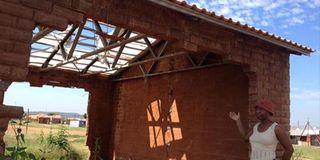How to protect your vacant property

People break into vacant buildings for many reasons and may cause significant damage. Vandals can cause damage as minor as broken windows, graffiti, and sometimes, total destruction of the house. Courtesy photo
What you need to know:
If your former home has not been sold off, your vacant property could fall victim to system failure, vandalism, or burglary. Take steps to lessen the risk for potentially costly issues.
A home is considered vacant when you have moved out and taken your belongings with you. Whether it is a second home, rental property, or a vacation pad, unprotected vacant properties are susceptible to theft, vandalism, trespassing, and weather. In many ways, there are more dangers associated with a vacant building. It is essential to understand what these dangers are and implement steps to prevent them.
Theft
Some people may think there would be nothing to steal from a vacant room or house but the thieves probably think it is less risky to steal from vacant property as there are lesser chances of being caught says Tito Odoi, the director Globe Property Management Services.
He adds: “Empty buildings attract anti-social behaviour, so your vacant house may be a meeting place for the thugs or store for their loot depending on its location. Also, people may break into vacant building which is likely to cause you significant damage due to vandalism.”
Trespassing
There are very many homeless people looking for free shelter and if there is any vacant property, they will definitely sleep there especially where there is no restriction on entrance.
They may stay for a long period of time and cause damage to the building. They may also break into vacant properties to engage in criminal and illegal activities such as drug dealing.
Weather and pests
Weather, rain or sunshine, can damage both the interior and exterior of a building over a period of time leading to wear and tear. “Although weather can still affect the house even when occupied, the property becomes more prone to pests such as termites while it is unoccupied,” says Odoi.
There can also be damage resulting from rusty water pipes which is likely to increase your cost of maintenance of the property thereby delaying its occupancy by tenants who prefer ready to move in houses than waiting for repairs to be made.
Revoked insurance
If you had insured your property and it stays too long without being occupied, it may not be reinsured according to Catherine Kembabazi, a freelance property manager.
She says, “The insurance company could revoke some of its policies on the property such as protection against loss resulting from burglary because the insurance company begins to anticipate higher risk of such an occurrence since the property is vacant.” It is, therefore, important that you call your insurance agent to verify the coverage on your property and when it expires.
Maintaining the property
If your property will be vacant for a period of time you do not know, a live-in caretaker (could be a friend or relative) is recommended as long as they agree to look after the property in exchange for housing until you find a tenant.
Kembabazi says: “You can also inform the neighbours that the property is vacant so that they call you in case they notice something suspicious. You should also visit the property frequently to scare off prospective break-ins or ill-intentioned people.”
It is advisable according to Odoi to carry out periodic fumigation to prevent any damage from pests such as termites, bats and other insects.
Keep the place locked
If it is a house, it is important to keep all windows and doors locked with heavy duty and even multiple locks. This will not only provide security to your house but will create yet another visual deterrent to potential intruders.
“If you have contacted a letting agent or broker, keep track of who is entering your property and make sure you know how they have been given access. If you want to make sure you are the only person who has access to the place, change the locks on all access points of the building,” Kembabazi advises.
Warn them off
Put relevant warning signs in obvious places around your property. These signs could allude to a particular security system, CCTV camera surveillance or even something as simple as “Beware of dogs”. “Installing a mobile alarm system with infra-red movement sensors will alert you or the relevant authorities when your property has been broken into, so that there can be immediate and appropriate help,” Odoi says.
You can keep your eye open on your property by installing CCTV cameras to provide you with recordings of vandalism or theft which could provide vital evidence if your case is taken to court.
Fence it off
If your vacant property (land or house) is in a secluded place or an area prone to crime, you may want to consider security fencing. The type of fencing will depend on your budget and security needs. Fencing will make it harder for intruders to get in, and give no room for squatters or thieves.
Catherine Kembabazi, a freelance property manager, says: “Considering the fact that vacant properties usually have no electricity to power a security system, if you are not sure how long the house is going to stay vacant, you may choose to board up the windows and doors using plywood to keep out intruders.”




